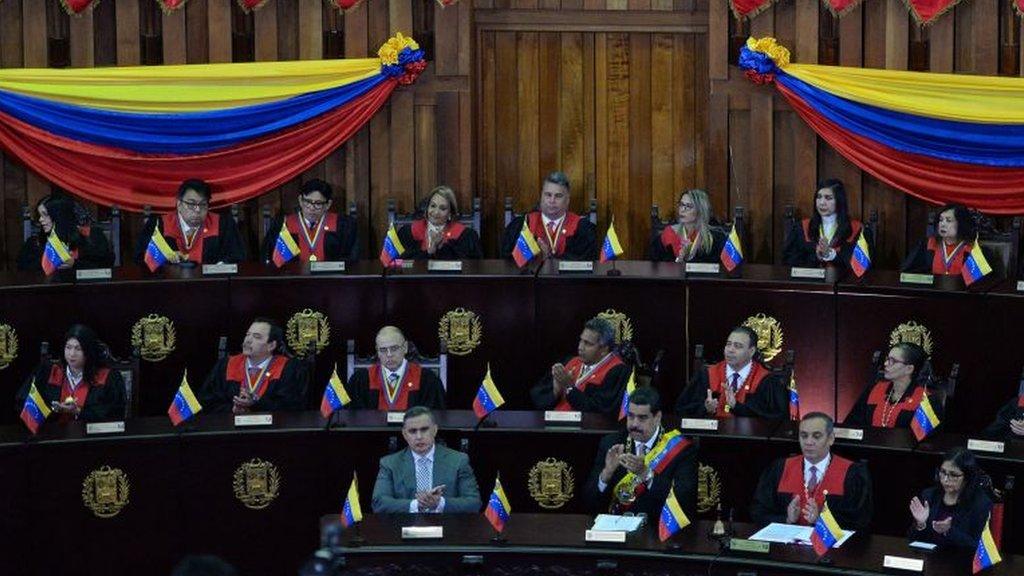Venezuela polls: Opposition hopes to break stalemate
- Published
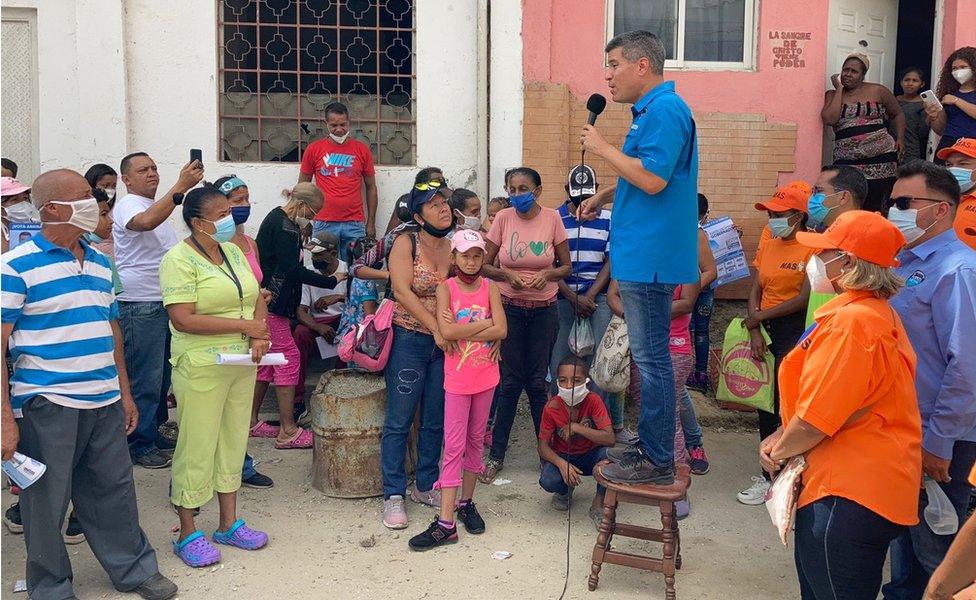
Opposition candidate David Uzcátegui is trying to inspire despondent Venezuelans to vote
"Do you want change or more of the same?" Venezuelan opposition candidate David Uzcátegui asks standing on a wooden stool, microphone in hand.
He is addressing a crowd of less than 100 people, speaking enthusiastically about improving the lives of this poor community if they vote him in as governor of Miranda, Venezuela's second most populous state.
This is a country where people are so desperate - for food, for jobs, for money - that the political language most people have come to understand is handouts.
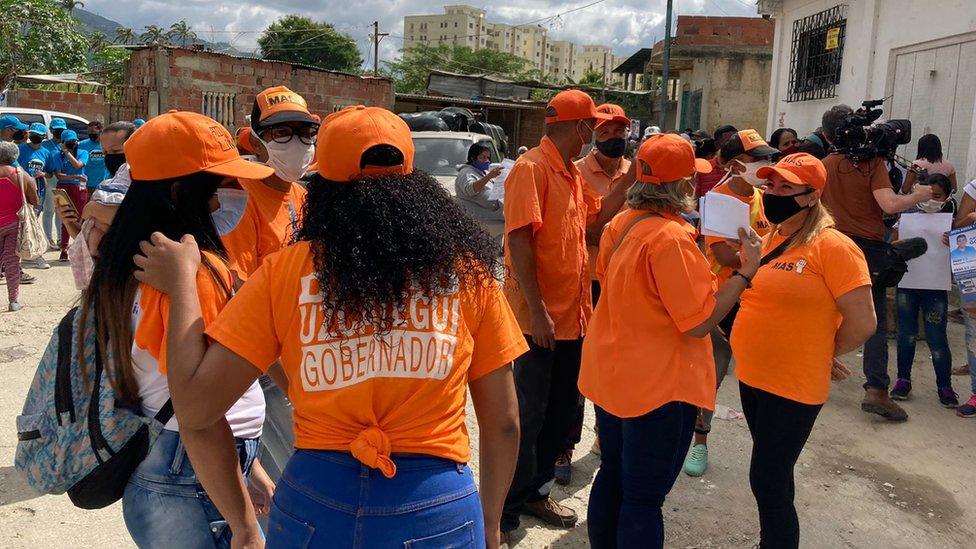
Handouts at campaign rallies are nothing unusual
And so, done with the speech, Mr Uzcátegui and his team turn into Santa and the elves, pressing medicines into the palms of residents who had given a community leader a wish-list ahead of the event.
Hoping for miracles
The neighbourhood we are in is called Milagro, Spanish for miracle.
And on the white walls of many houses the words "The blood of Christ is all-powerful" are painted in red.
This is a place where people have come to have more faith in divine intervention than politicians to lift them out of poverty.
During the event, Mr Uzcátegui explains to the crowd which boxes they need to tick on the ballot paper on Sunday.
It sounds pretty desperate but it is not without reason. Two days before, a rival opposition candidate decided to pull out of the race, opting to back Mr Uzcátegui instead.
But the decision was made too late for the electoral board to take the politician's name off the ballots, so his name will still appear but all votes for him will be void.
From boycott to reluctant participation
The opposition in Venezuela is in a difficult place. For the past few years, the main parties have boycotted elections, arguing that they lack the conditions to be free and fair.
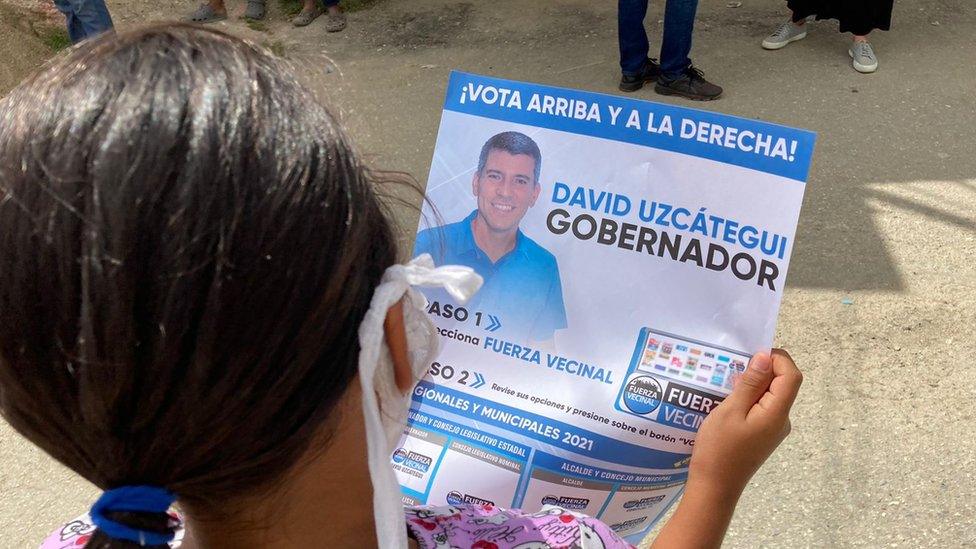
The main opposition parties are taking part in the polls after years of boycotts
Instead, they have taken other approaches to try and unseat President Nicolás Maduro, who has been in power since 2013, when his predecessor in office and mentor, Hugo Chávez died.
Among these measures has been backing opposition politician Juan Guaidó, who declared himself president with the support of the National Assembly, which at the time was dominated by opposition parties.
Mr Guaidó's move that was supported by many in the international community and more than 60 countries officially recognised him as the legitimate leader of the country
But nothing has changed in Venezuela itself, Mr Maduro is still the man in the presidential palace and Mr Guaidó's popularity has waned.
Many people feel the opposition has failed them time and time again.
Hope for revival
So now, the opposition parties are back in the game, hoping to revive the election process.
"The best way to describe these elections is that this is a trial run for the opposition," says Geoff Ramsey from the Washington Office on Latin America.
"What this is about is the opposition trying to rebuild its electoral muscle after years of abstention. Nobody is seeing this as a pivotal moment for Venezuela, for the path back to democracy in Venezuela."
Mr Uzcátegui is part of Fuerza Vecinal (Neighbourhood Power), a new opposition party that is trying to offer an alternative to more established parties, many of whose leaders have been exiled.
There is a feeling that traditional opposition parties are out of touch with the reality on the ground.
"The best leaders are those in the community, in unions, in neighbourhoods," says Mr Uzcátegui.
"They allow a movement to grow from the bottom up, disrupting politics, and that can triumph over the political stalemate that President Nicolás Maduro has created."
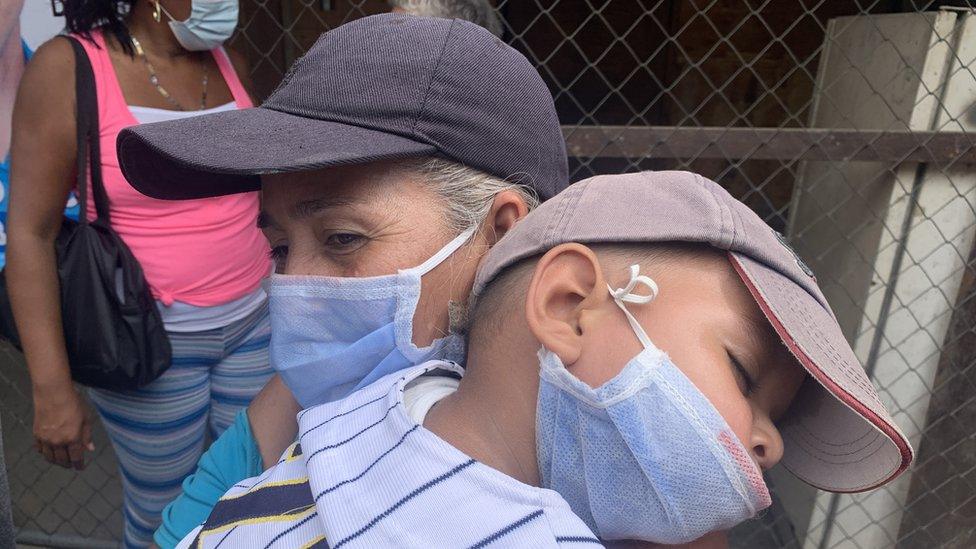
Neida Villaparedes looks after her grandson after his mother left for Colombia
Neida Villaparedes wants to be part of that disruption. She is waiting in line patiently, with her two-year-old grandson Darrell sleeping in her arms.
She is queuing for a voucher Mr Uzcátegui's team is giving out that will help pay for building materials to finish off her house.
"He's helping us with things we need," Ms Villaparedes says of the opposition candidate.
She has been on her own with little Darrell ever since his mum left for neighbouring Colombia to find work when he was just a few months old.
"I used to support the government but no longer. Things have to change here because life has become so difficult."
Twenty minutes drive away, the government is also holding a rally. It has a totally different vibe. There is very much a party atmosphere and it even feels like a victory parade.
In the crowd, there are members of youth groups and community leaders, many of whom have been brought in from nearby communities in government buses.
"The opposition isn't united," Bryan Zambrano tells me. "It doesn't give young people any opportunities."
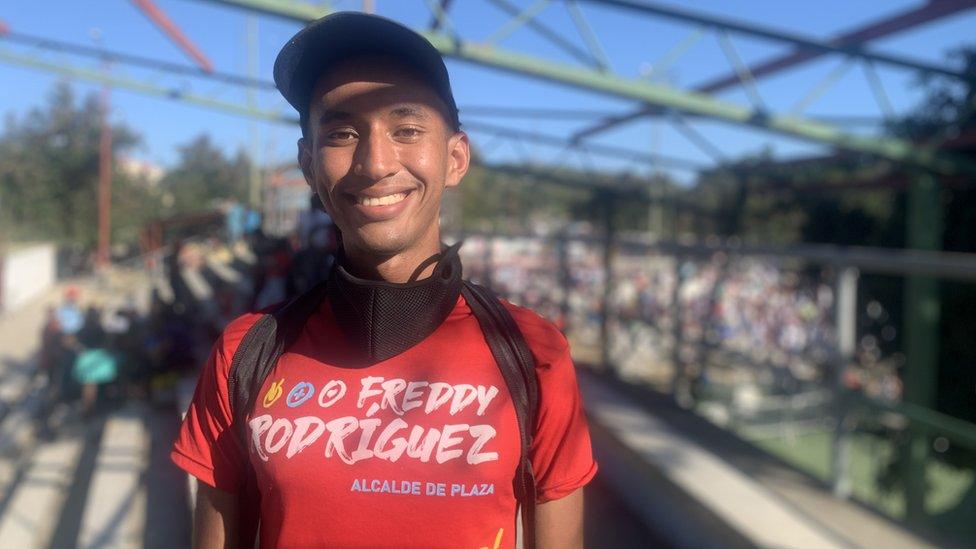
Bryan Zambrano says he will vote for the government as a means to get more opportunities
There is no getting away from it, with splits in the opposition, the government is in a stronger position despite the economic and social crisis which Venezuela is mired in.
In these elections, the government is also being watched. European Union observers were invited here for the first time in more than a decade.
While critics have voiced concern that their presence risks legitimising an election process widely seen as flawed, the mission's deputy chief, Xabier Meilán argues otherwise.
"We are doing our work, and we will be issuing a preliminary statement with our honest findings after more than a month in the field," he said.
"We are professionals, we've been doing this for years, the EU has been in more than 150 elections in the last 20 years."
The government is rolling out the red carpet for its visitors. But many here in Venezuela feel it is all too little, too late and turnout for these regional elections is expected to be low.
It may be a step in the right direction with candidates running against the government, but few see these elections as either free or fair.

You may want to watch:
Venezuela's paradise beach resort turns into violent nightmare
Related topics
- Published4 November 2021
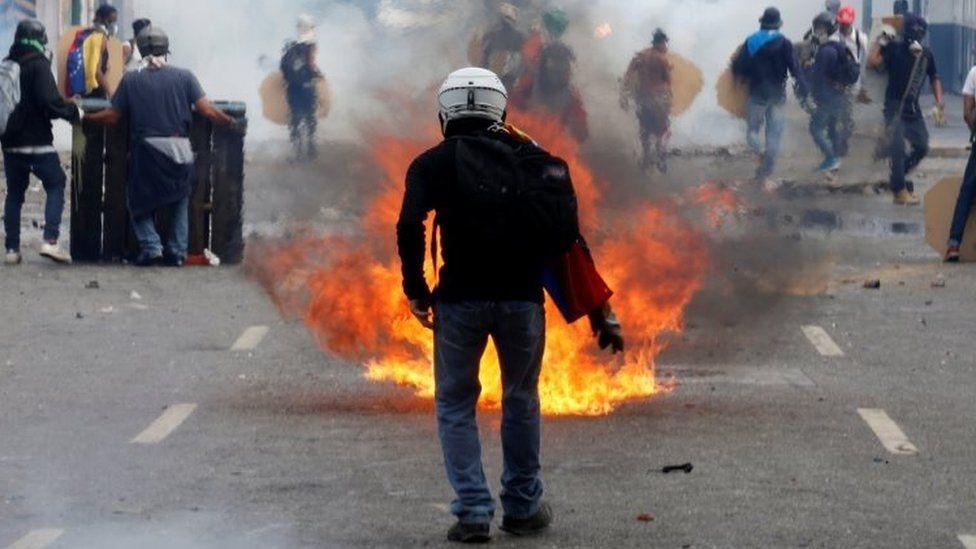
- Published20 October 2021
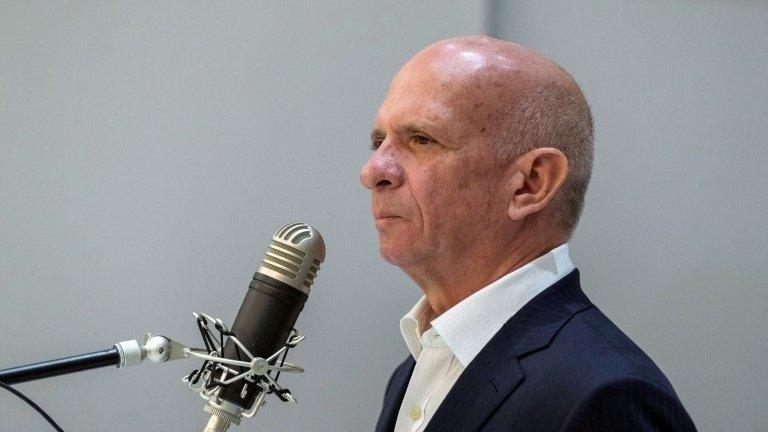
- Published17 October 2021
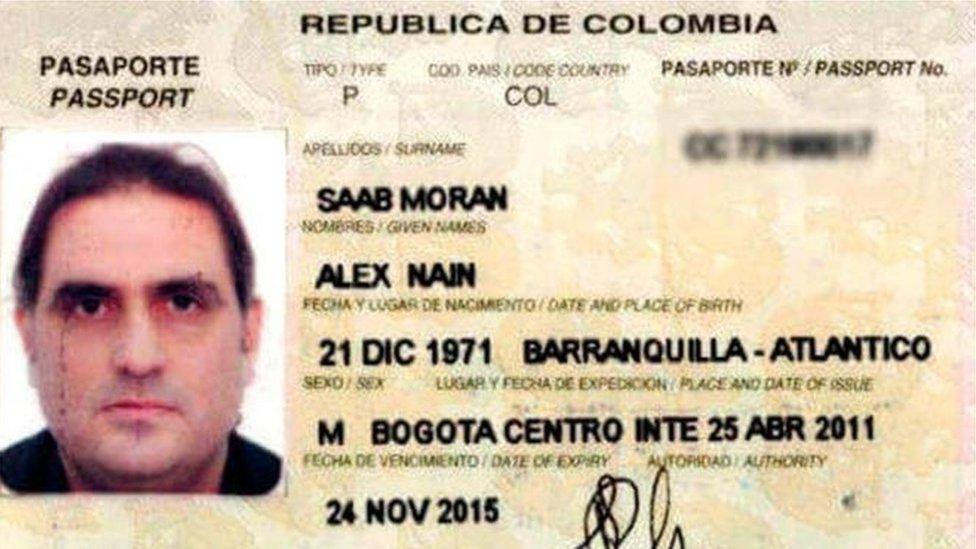
- Published30 September 2021
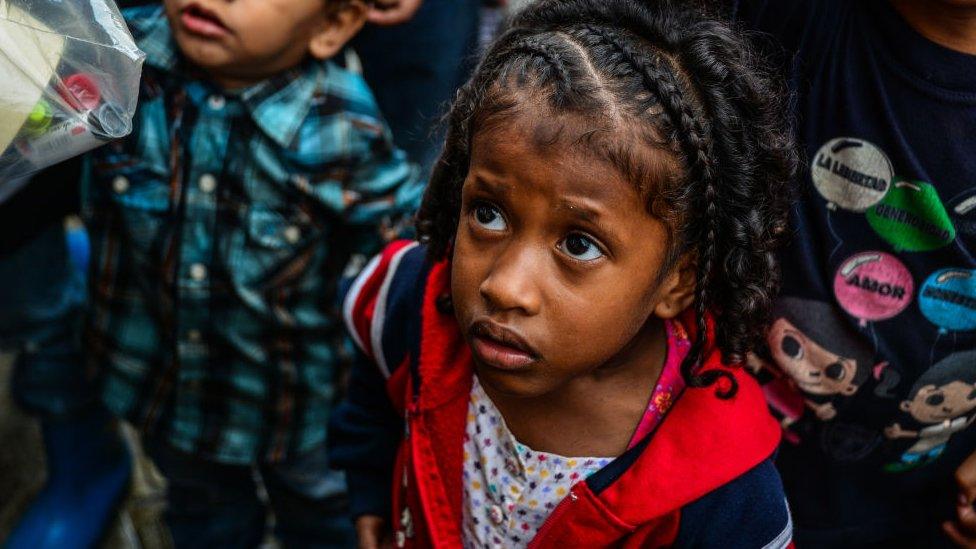
- Published16 September 2021
